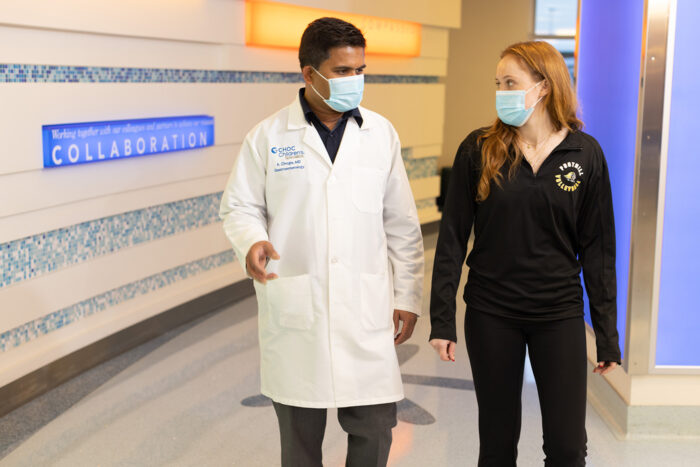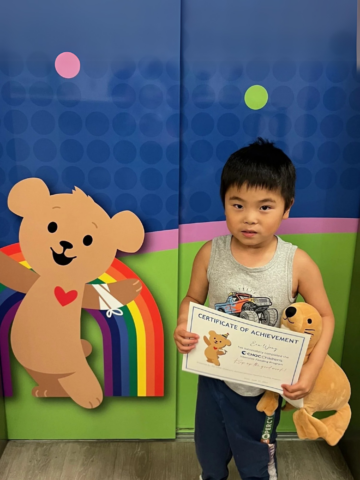How parents can build an effective partnership with their child’s GI healthcare team
By Dr. Ashish Chogle, pediatric gastroenterologist
Functional gastrointestinal (GI) disorders are a group of conditions that affect the digestive system, causing long-standing symptoms like abdominal pain, bloating, constipation or diarrhea without any visible structural abnormalities (physical signs of problems). Examples of functional gastrointestinal disorders include irritable bowel syndrome, functional abdominal pain and abdominal migraines.
Building an effective partnership with their healthcare team is crucial for parents of children with functional gastrointestinal disorders to ensure the best possible care and management of their child’s condition. Here are some tips to help parents foster a strong relationship with their healthcare team.
First, it’s important for parents to understand functional gastrointestinal disorders.
GI disorders occur because of problems in the communication between the gut and the brain. They involve a combination of factors such as nerve sensitivity, movement abnormalities, gut immune function changes and alterations in gut bacteria.
Children with functional gastrointestinal conditions may have a more sensitive gut, causing them to experience pain or discomfort more easily than others. This heightened sensitivity can lead to symptoms like:
- Abdominal pain.
- Nausea.
- Bloating.
- Changes in bowel habits.
These conditions can be associated with irregular muscle contractions in the gut, leading to either slow or rapid transit of food through the digestive system, resulting in symptoms like constipation, diarrhea, or both.
Common triggers for functional GI disorders
Imbalances in the gut microbiome (the community of bacteria that live in the digestive tract) have been linked to functional gastrointestinal disorders. These imbalances can affect digestion, gut motility (the movements of the digestive system and the transit of the contents within it), and immune function, which can potentially trigger the symptoms mentioned above. This may cause some children to have difficulty tolerating specific foods, such as lactose or gluten.
Get more expert health advice delivered to your inbox monthly by subscribing to the KidsHealth newsletter here.
Stress, anxiety, and emotional distress can exacerbate gastrointestinal symptoms. While these psychological factors do not cause the disorders, they can significantly trigger, worsen or prolong symptoms. It’s essential to understand that functional gastrointestinal disorders are real medical conditions, not just “in your child’s head.”
Past episodes of inflammation (infections, allergies, etc.) may trigger the onset of functional gastrointestinal disorders. Evidence suggests that these conditions can run in families, indicating a possible genetic link.
Understanding the potential causes and triggers can help parents work with healthcare professionals to develop an effective management plan for their child. This may include:
- Herbal medications.
- Acupuncture.
- Vagus nerve stimulation.
- Dietary modifications.
- Psychotherapy, including stress reduction techniques, cognitive behavioral therapy, hypnotherapy, biofeedback, and medical treatments to help manage symptoms and improve the child’s quality of life.
- Pharmaceutical medications.
It’s important to remember that treatment will improve your child’s day-to-day functioning before it starts improving gastrointestinal symptoms.
Learn as much as you can about your child’s condition, potential treatments and management strategies. This knowledge will empower you to make informed decisions and contribute meaningfully to discussions with the healthcare team.
Be prepared for GI clinic visits
Be informed and organized when preparing for a clinic visit with your child by doing the following:
- List your child’s symptoms, how often they occur, their duration and anything that triggers or eases them. Notice how these symptoms affect your child’s daily life, like school, social activities and well-being.
- Be ready to discuss any concerns or fears about your child’s condition.
- Make a list of all your child’s current and past medications.
- If possible, take pictures of the medication bottles to avoid mistakes while giving information about medicine dosages.
- Please inquire with your immediate family about any medical conditions that they might have.
- Ensure the doctor’s office has your child’s medical records before the visit for review.
- Being prepared and involved will help your doctor or nurse better understand your child’s situation and provide the proper support and care.
- Recognize that there may not be a quick fix for your child’s condition, and progress may be gradual.
Setting realistic expectations for both the healthcare team and your child will help maintain a positive and productive relationship.

Have open communication during clinic visits
Open and honest communication during your child’s appointment gives your healthcare team all the information they need to best care for your child. During your visit, I suggest being prepared to do the following:
Evaluate and describe your child’s main concerns carefully.
Please encourage your child to share their experiences openly and honestly. Participate in the conversation and ask questions to understand the information and recommendations better. Your active involvement will demonstrate your commitment to your child’s care and encourage a collaborative relationship.
Explain why you need help now, especially if it’s a long-lasting issue, and share your concerns.
Discuss how this affects your child’s life, such as school, hobbies, social interactions, emotions and family relationships.
Parents might forget or feel embarrassed to discuss all their child’s symptoms, so encourage your child to be open and share any concerns you have noticed.
Share your thoughts about the possible cause or condition, and don’t hesitate to express any fears or concerns you may have. Open communication will help your medical team better understand your situation and provide proper support.
Work together with your healthcare team
Compassion, empathy and trust are essential in any successful patient-physician relationship. Parents, the child and the medical team should work together to help the child heal.
Understand that managing these chronic conditions can be a complex and ongoing process. Be patient with your healthcare team as they work to find your child’s best course of action and be open to adjusting the treatment plan as needed.
You should expect the healthcare team to share easy-to-understand information about the diagnosis, set common goals for the child’s care, allow parents to participate in decisions about tests and treatments, and have a positive attitude while understanding the effects of functional gastrointestinal disorders on the child and family.
Let the healthcare team know how your child is progressing with their treatment plan and any changes in their symptoms.
Be your child’s voice, particularly if they are too young or uncomfortable to speak for themselves.
Communicate their needs, concerns, and preferences to the healthcare team to ensure they receive the best possible care. Be aware of any comments from the healthcare team that might downplay the condition or blame it only on stress and ask for clarification when needed. Express your gratitude for their support and care, which can strengthen the partnership and encourage continued collaboration.
By understanding functional gastrointestinal disorders and the role of the mind and body in their child’s condition, parents can communicate effectively with their healthcare team to build a strong, supportive relationship that leads to better health outcomes.
Get more expert health advice delivered to your inbox monthly by subscribing to the KidsHealth newsletter here.
Learn more about the gastroenterology (GI) program at CHOC
Our gastroenterology team is committed to offering patients the very latest treatments in an environment dedicated to patient- and family-centered care.





